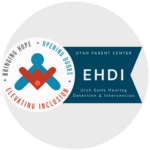
Newborn Screening & Congenital Cytomegalovirus
Language and communication development starts at birth. In order for language and communication access to be provided, hearing loss must be identified early in order to provide timely intervention. In Utah, this means all newborns should complete the newborn hearing screening process before 10 days of age. The sooner each step is completed the better.
There are two types of newborn hearing screening: otoacoustic emissions (OAEs) and automated auditory brainstem response (AABR). Both are simple and painless and both give a result of ‘pass’ or ‘fail’. A failed hearing screening does not mean there is hearing loss, but that further testing is needed.
These screening results will guide each family on the next steps for their child’s hearing health. If a newborn fails the first hearing screening, they will be brought back for a repeat hearing screening which should be completed before 10 days of age.
What does a ‘pass’ result mean? If a newborn has passed the screening, the function of the inner ear is likely within normal limits. However, it is possible that a mild hearing loss or a hearing loss in a narrow range of frequencies (pitches) has been missed. Hearing levels can also change. A family and their primary care provider should monitor speech, language and hearing development as the child grows. Notify the provider if there are any concerns about development.
What does a ‘fail’ result mean? If a newborn fails the rescreening, there are two next steps: 1) testing for congenital cytomegalovirus or CMV; and 2) schedule a diagnostic hearing test with a pediatric audiologist. Scan the QR code below to find a pediatric audiologist near you.
What is congenital CMV? CMV is a common virus that infects people of all ages. However, when CMV occurs during pregnancy, the baby can become infected before birth – this means it is congenital. When this happens, the virus gets transmitted to the unborn baby and can potentially damage the brain, eyes, and or inner ears. CMV is the most common non-genetic cause of hearing loss.
CMV testing is time sensitive and should be done as soon as possible, but no later than 21 days of age. Often, this is completed at the hospital lab right after the baby has failed the hearing screening. Testing is painless, only requiring a saliva or urine sample.
The newborn hearing screening process (initial screening, and if needed, rescreening, and CMV testing) needs to be completed without delay in order to be sure infants who are deaf or hard of hearing can be identified early.
For more information visit https://familyhealth.utah.gov/cshcn/ehdi/ email ehdi@utah.gov or visit the following article from the UPC website






